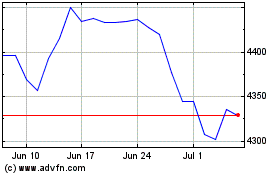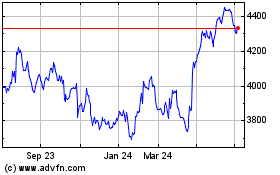Kraft Withdraws $143 Billion Offer for Unilever -- 2nd Update
February 19 2017 - 2:32PM
Dow Jones News
LONDON -- Kraft Heinz Co. dropped its $143-billion offer for
rival Unilever PLC, just a little more than 48 hours after making
an audacious bid to combine two of the world's biggest
packaged-food companies.
In a brief statement Sunday, Kraft said it "has amicably agreed
to withdraw its proposal."
A Kraft spokesman said the company's intention was to proceed on
a friendly basis, and that its interest was made public at "an
extremely early stage." After Unilever made clear it didn't want to
pursue a tie-up, the spokesman said, "it was best to step away
early so both companies can focus on their own independent plans to
generate value."
The U-turn is a big victory for Unilever Chief Executive Paul
Polman, who was digging in over the weekend to resist the
unsolicited offer. The deal faced steep hurdles from the start --
first among them a determination by Unilever's board and management
that the 18% premium Kraft offered to the company's value was
inadequate.
Mr. Polman was ramping up a defense, telling board members and
investors that Kraft's cost-cutting ethos could damage Unilever
brands and highlighting its lack of experience in personal-care and
household goods, according to people familiar with the matter.
While price remained key, Mr. Polman also wanted to protect
Unilever's reputation for promoting sustainability initiatives,
including environmental and human-rights efforts, according to
people familiar with the matter. Some investors have complained in
the past that Mr. Polman has spent too much time on those efforts,
instead of focusing on returns. Supporters say the efforts help,
including by attracting stronger talent.
In its statement, Kraft said it has the "utmost respect for the
culture, strategy and leadership" of Unilever.
Still, price remained the biggest factor, after Unilever
management rejected the $50-a-share cash-and-stock offer outright
Friday. Directors had been considering a board meeting as early as
this week, but serious discussions about Kraft's approach were
never likely without a higher price, according to one person
familiar with the matter.
Valuation aside, 3G Capital Partners LP, which orchestrated the
2015 merger of Kraft and Heinz with Warren Buffett, and remains
Kraft's biggest shareholder, faced a host of other hurdles that
made a deal more complicated to pull off. Unilever maintains a
complicated dual structure in the U.K. and the Netherlands that
gave governments, regulators, certain shareholders and other
players outsize say in whether a deal got done.
In the Netherlands, the company's European Works Council,
comprising worker representatives, must be kept apprised of deal
developments. It probably couldn't have prevented a deal from
happening. But with an election in the Netherlands being held next
month, labor opposition could have triggered closer scrutiny by the
government.
Meanwhile, two big institutional investors in the Netherlands
were set to play an important role, and their sentiment over the
deal was uncertain. Insurers NN Group NV and ASR Nederland NV,
which is majority owned by the Dutch government, together account
for about 20% of the voting rights in Unilever NV, the Dutch arm,
according to a person familiar with the holdings. That translates
into roughly 8% of the combined companies' voting rights.
In the U.K., the Leverhulme Trust, a research-focused charity,
owns over 5% of the British arm of the company, according to
FactSet. The trust was set up in 1925 by William Hesketh Lever, the
founder of Lever Bros., which merged with a Dutch margarine maker
to form Unilever. The trust's board includes Mr. Polman and two
former Unilever CEOs. A trust representative didn't immediately
respond to a request for comment.
(END) Dow Jones Newswires
February 19, 2017 14:17 ET (19:17 GMT)
Copyright (c) 2017 Dow Jones & Company, Inc.
Unilever (LSE:ULVR)
Historical Stock Chart
From Mar 2024 to Apr 2024

Unilever (LSE:ULVR)
Historical Stock Chart
From Apr 2023 to Apr 2024
